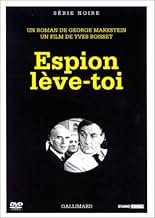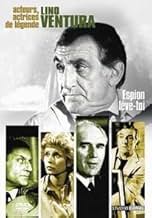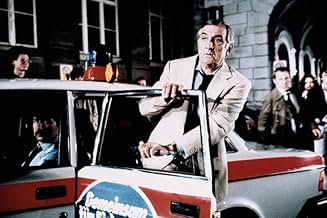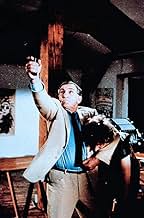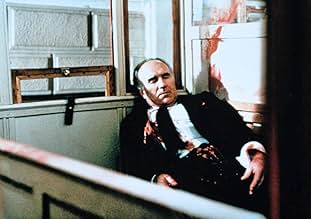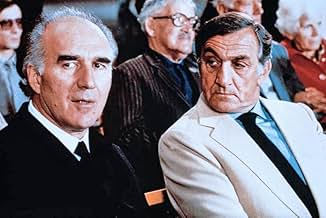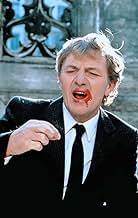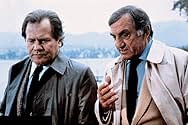Espion, lève-toi
- 1982
- 1 h 38 min
AVALIAÇÃO DA IMDb
6,6/10
1,4 mil
SUA AVALIAÇÃO
Adicionar um enredo no seu idiomaSébastien Grenier, a French sleeper agent in Switzerland, is contacted after eight years of silence after the murder of an other mole. But he doubts the identity of the person who presents h... Ler tudoSébastien Grenier, a French sleeper agent in Switzerland, is contacted after eight years of silence after the murder of an other mole. But he doubts the identity of the person who presents himself as his superior.Sébastien Grenier, a French sleeper agent in Switzerland, is contacted after eight years of silence after the murder of an other mole. But he doubts the identity of the person who presents himself as his superior.
- Direção
- Roteiristas
- Artistas
- Prêmios
- 1 indicação no total
Kurt Bigger
- Alfred Zimmer
- (não creditado)
Pierre Boffety
- Postman
- (não creditado)
Yves Boisset
- L'adjoint de Richard
- (não creditado)
Ali Lexa
- Man in bar
- (não creditado)
Avaliações em destaque
Sebastien Grenier is a successful French businessman, who has been living in Switserland for several years. He's married to a German professor of literature. But Grenier has a secret: he used to be a field agent for the French secret service SDECE. However, as the years went by, he certainly don't expect a wake up call any longer. He couldn't have been more wrong
Similarly as with CIA-agents, once SDECE, always SDECE
He's played by a somewhat grumpy, tired looking Lino Ventura.
It all starts with a RAF style execution of a passenger in a tramway by a leftist terrorist group. From then on, Grenier gets caught in a whirlwind of events, leading to several other violent deaths. The "where's" and "when's" of these events are announced in a cool voice by a narrator. (Several other spy movies use a similar semi-documentary approach, others use a "telex"-message for the same purpose). The first victim is Henri Marchand, another SDECE-agent, played by Bernard Fresson. Many Americans will remember him as the French commissaire Barthélémy in French Connection II, with his funny clashes with "Popeye" Doyle (Gene Hacklman.
Grenier soon realizes that he might not live very long anymore. But who is the spider in the deadly web around him ? Is it the mysterious and cold "Richard", played by Bruno Cremer ?(of "Maigret"-fame). Or is it Jean-Paul Chance, a slick Swiss high official from the Justice Department, who seems to be extremely well informed by whatever Grenier is doing. (Chance is played by Michel Piccoli, who clearly enjoys irritating the Grenier-character). Who's systematically knocking out several pawns on the international chess game, and why ? In the end, the French former agent will manage to shed some light into some dark corners. What he doesn't realize is that the gun, pointed at his back is hidden in another shadowy corner. Or is he ?
Not a bad movie, but by far not as good as "Le silencieux" (1973, also with Ventura. Maybe the movie doesn't really manages to create a real mysterious atmosphere of clear and present danger, as for example "La septième cible" manages to do in a better way. The way the secret agents communicate with each other also has something laughable, it all looks so terribly boyscoutish. It also made me seasick to see how sparkless the Grenier-Gretz "couple" apparently had become. They were clearly at the brink of a total burn out, before death took its toll In fact, the whole movie has something extremely depressing: the tired looks of Grenier, his moody interactions with his business collaborator, his secretary and his wife, and every one involved in the story. The soundtrack consists of a sober, efficient but also somewhat depressing march, yet another Morricone creation. Even the landscapes of Switserland surely wouldn't be the ones I would use to attract more tourists
It all starts with a RAF style execution of a passenger in a tramway by a leftist terrorist group. From then on, Grenier gets caught in a whirlwind of events, leading to several other violent deaths. The "where's" and "when's" of these events are announced in a cool voice by a narrator. (Several other spy movies use a similar semi-documentary approach, others use a "telex"-message for the same purpose). The first victim is Henri Marchand, another SDECE-agent, played by Bernard Fresson. Many Americans will remember him as the French commissaire Barthélémy in French Connection II, with his funny clashes with "Popeye" Doyle (Gene Hacklman.
Grenier soon realizes that he might not live very long anymore. But who is the spider in the deadly web around him ? Is it the mysterious and cold "Richard", played by Bruno Cremer ?(of "Maigret"-fame). Or is it Jean-Paul Chance, a slick Swiss high official from the Justice Department, who seems to be extremely well informed by whatever Grenier is doing. (Chance is played by Michel Piccoli, who clearly enjoys irritating the Grenier-character). Who's systematically knocking out several pawns on the international chess game, and why ? In the end, the French former agent will manage to shed some light into some dark corners. What he doesn't realize is that the gun, pointed at his back is hidden in another shadowy corner. Or is he ?
Not a bad movie, but by far not as good as "Le silencieux" (1973, also with Ventura. Maybe the movie doesn't really manages to create a real mysterious atmosphere of clear and present danger, as for example "La septième cible" manages to do in a better way. The way the secret agents communicate with each other also has something laughable, it all looks so terribly boyscoutish. It also made me seasick to see how sparkless the Grenier-Gretz "couple" apparently had become. They were clearly at the brink of a total burn out, before death took its toll In fact, the whole movie has something extremely depressing: the tired looks of Grenier, his moody interactions with his business collaborator, his secretary and his wife, and every one involved in the story. The soundtrack consists of a sober, efficient but also somewhat depressing march, yet another Morricone creation. Even the landscapes of Switserland surely wouldn't be the ones I would use to attract more tourists
Yves Boisset has always been a politically committed director,but his stories are always linear and accessible:hence their efficiency,even if people complain about their manicheism or naiveté.One cannot deny their impact on the audience when it comes to depicting the Algerian war (in RAS) or racism (in Dupont Lajoie,probably his best effort).
"Espion lève -toi" moves in another direction ;relatively speaking it shows the influence of Pakula and "the parallax view".A hero (Ventura)fighting against something he does not really understand,estranged from his compatriots in Zurich ,Switzerland,the symbol of the power of money.Around him everybody's dying,even his lover ,a German professor is threatened ,and maybe she's not the woman he thinks she is (hints at Baader's gang and terrorism).When Ventura strikes back,not only it's too late but it may also be absurd and pointless:he 's nothing but a puppet on a string like laurence Harvey in "Mandchourian candidate" .
This movie is unique in Boisset's career:it was initially to be directed by Zulawski,and the snub critics used to say what a better movie it would have been !It's not sure :Zulawski's works are often pretentious and -in France,abroad they do not seem to bother- overrated ("posession" or "l'important c'est d'aimer")and Boisset's simplicity and academic but efficient style fit the screenplay like a glove.Unlike Frankenheimer's and Pakula 's works I Mention above,"Espion lève- toi" is no masterpiece but it should appeal to people who like this genre.
Yves Boisset got lost after this effort:he tackled pure thriller with "le prix du danger" "canicule "or "bleu comme l'enfer",and deprived of his political or social comments he was nothing but another director
"Espion lève -toi" moves in another direction ;relatively speaking it shows the influence of Pakula and "the parallax view".A hero (Ventura)fighting against something he does not really understand,estranged from his compatriots in Zurich ,Switzerland,the symbol of the power of money.Around him everybody's dying,even his lover ,a German professor is threatened ,and maybe she's not the woman he thinks she is (hints at Baader's gang and terrorism).When Ventura strikes back,not only it's too late but it may also be absurd and pointless:he 's nothing but a puppet on a string like laurence Harvey in "Mandchourian candidate" .
This movie is unique in Boisset's career:it was initially to be directed by Zulawski,and the snub critics used to say what a better movie it would have been !It's not sure :Zulawski's works are often pretentious and -in France,abroad they do not seem to bother- overrated ("posession" or "l'important c'est d'aimer")and Boisset's simplicity and academic but efficient style fit the screenplay like a glove.Unlike Frankenheimer's and Pakula 's works I Mention above,"Espion lève- toi" is no masterpiece but it should appeal to people who like this genre.
Yves Boisset got lost after this effort:he tackled pure thriller with "le prix du danger" "canicule "or "bleu comme l'enfer",and deprived of his political or social comments he was nothing but another director
For me a recent discovery, this makes a great movie! - Okay, I understand that anyone who wants to understand a movie, and waits for the code to be implemented, this might be a disappointment. Though here we have great actors, especially Piccoli and Ventura, a tight and strict storyboard / script; and a good helping of suspense.
In principle we see a movie clipped together from a large bunch of consecutive moments in time (and location), inserted like subtitles, with a precision of minutes. Like flashlights on the developments. Good cinematography, no excess of brutality nor effects. Just a nice, though somewhat extraordinary, traditional movie.
I do wonder if I could really understand the plot, even if I watched this movie a dozen times. Though that doesn't make the movie seriously worse, because the main line of action is always clear. That is, what is happening. Unclear remains, who is on which side, and how the whole matter got started.
Watch it, if you can!
In principle we see a movie clipped together from a large bunch of consecutive moments in time (and location), inserted like subtitles, with a precision of minutes. Like flashlights on the developments. Good cinematography, no excess of brutality nor effects. Just a nice, though somewhat extraordinary, traditional movie.
I do wonder if I could really understand the plot, even if I watched this movie a dozen times. Though that doesn't make the movie seriously worse, because the main line of action is always clear. That is, what is happening. Unclear remains, who is on which side, and how the whole matter got started.
Watch it, if you can!
I caught this film on a hotel room TV set, just when I was going to bed. A look at Lino Ventura made me stay just for a few minutes - and finally I set on to the dramatic, dark end. Looking at my watch I noticed that I must have started watching the film just after the early credits.
This capacity of keeping even a tired spectator awake is a trade mark of director Yves Boisset, with an easy to follow storyline told so that it is new, or old seen through interesting new angles. The ambiance is luxurious Switzerland and French intelligence headquarters, or college's libraries - for spying is done not only by your common 007-type of agent, but by people "above all suspicion".
Ventura plays a retired agent living a peaceful life with a younger, loving German woman, who's teaching in France, when he is called into active service again - very much against his will. When he finally starts suspecting all people around him - minus those who fall dead after he makes the first moves into knowledge... - it will be too late. Too late to avoid discovering the unthinkable truth, and too late to get back to his peaceful retirement.
The dark end may not please all viewers, but it is actually a signal of the times the movie was made - and now that you are a quarter of a century past that, you may notice that it was a forewarning against the all encompassing spying and intruding on people's lives from those people up there who are "above all suspicion"!
This capacity of keeping even a tired spectator awake is a trade mark of director Yves Boisset, with an easy to follow storyline told so that it is new, or old seen through interesting new angles. The ambiance is luxurious Switzerland and French intelligence headquarters, or college's libraries - for spying is done not only by your common 007-type of agent, but by people "above all suspicion".
Ventura plays a retired agent living a peaceful life with a younger, loving German woman, who's teaching in France, when he is called into active service again - very much against his will. When he finally starts suspecting all people around him - minus those who fall dead after he makes the first moves into knowledge... - it will be too late. Too late to avoid discovering the unthinkable truth, and too late to get back to his peaceful retirement.
The dark end may not please all viewers, but it is actually a signal of the times the movie was made - and now that you are a quarter of a century past that, you may notice that it was a forewarning against the all encompassing spying and intruding on people's lives from those people up there who are "above all suspicion"!
I saw this film years ago when I was much younger and it was just another movie but 35 odd years later you understand what the story is about and its all very clever indeed
Você sabia?
- CuriosidadesThe movie was originally to be directed by Andrzej Zulawski. Zulawski left the project after dissensions between him and Lino Ventura.
- Erros de gravaçãoSeveral times throughout the movie a voice over states location and time the following events will take place. On the arrival of a train in Zurich central train station, it says 14h25 (2.25 pm) but two, perfectly visible railway station clocks show that it's in fact 11.43 am.
- ConexõesReferenced in Parole de cinéaste: Yves Boisset: le cinéaste le plus censuré de France (2013)
Principais escolhas
Faça login para avaliar e ver a lista de recomendações personalizadas
Detalhes
- Data de lançamento
- Países de origem
- Idiomas
- Também conhecido como
- Der Maulwurf
- Locações de filme
- Max-Joseph Platz, Munique, Baviera, Alemanha(as Munich's city library)
- Empresas de produção
- Consulte mais créditos da empresa na IMDbPro
Contribua para esta página
Sugerir uma alteração ou adicionar conteúdo ausente

